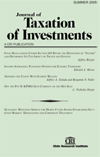The Individual Mandate, Taxation, and the Constitution
Author: Erik M. Jensen .
Source: Volume 30, Number 01, Fall 2012 , pp.31-49(19)

< previous article |next article > |return to table of contents
Abstract:
This article examines the Supreme Court’s 2012 decision in National Federation of Business v. Sebelius (NFIB ). That case held that the individual mandate penalty in the Obamacare legislation will be a tax and not a penalty, and that the penalty will therefore be constitutional under the Taxing Clause of the Constitution, even though a majority of the Court held that the mandate itself—the requirement to acquire insurance or pay the tax/penalty—was not a valid exercise of the commerce power. The result in the case was not necessarily a surprise, but the reliance on the taxing power was. This article discusses the understanding of the taxing power reflected in NFIB ; describes what Chief Justice Roberts did not say about the scope of that power; and considers what the decision means for future exercises of congressional power, concluding that NFIB is unlikely to cause Congress to abuse the taxing power.Keywords: National Federation of Independent Business v. Sebelius; individual mandate; individual mandate penalty; Obamacare; tax versus penalty; Taxing Clause; Commerce Clause; direct-tax apportionment rule; uniformity rule
Affiliations:
1: Case Western Reserve University School of Law.